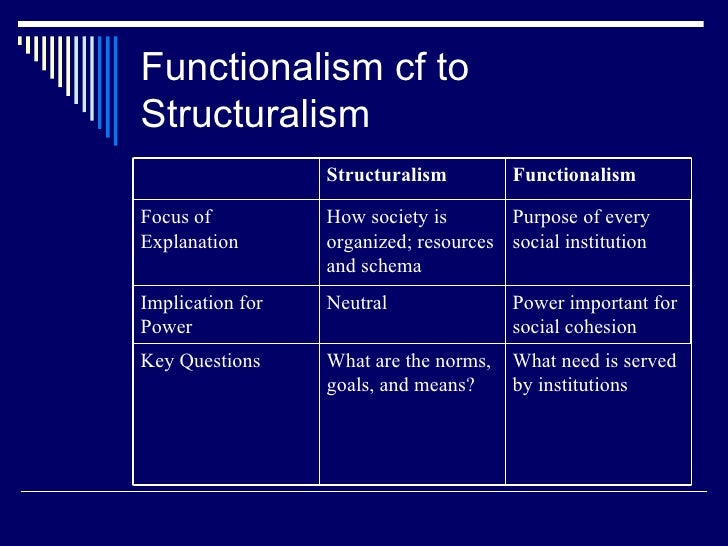Have you ever stopped to think about why people go to work every day, why we celebrate holidays, or why we have laws in place? These seemingly ordinary aspects of our lives are, in fact, the very fabric of society. Understanding how these pieces fit together is not only intellectually stimulating, but it can also offer valuable insights into our own behavior and the world around us. This is where the functionalist perspective comes in—a sociological lens that helps us see the interconnectedness of all parts of society, much like a finely tuned machine.

Image: www.masscommunicationtalk.com
In essence, the functionalist perspective sees society as a complex system, much like a human body, where each part works together harmoniously to ensure the overall health and stability of the whole. Just as our organs have specific functions, so do institutions like the family, education, religion, and the economy. These institutions are crucial because they fulfill essential needs, stabilizing society and maintaining order. But how does this all work in practice? Let’s dive deeper into the world of functionalism.
The Roots of Functionalism
The functionalist perspective traces its roots back to the 19th century and the work of thinkers like Herbert Spencer, who famously likened society to a living organism. However, it was Emile Durkheim, a French sociologist, who truly established functionalism as a major force in sociology. Durkheim believed that society was characterized by a collective conscience, a shared set of beliefs and values that held individuals together. He argued that social institutions played a vital role in maintaining this collective consciousness, promoting solidarity and social order.
Key Concepts in Functionalism
Functionalism is based on a few central concepts that help us understand how society functions:
- Social Facts: Durkheim emphasized the importance of social facts—observable patterns of behavior that exist independently of any individual. These facts, like social norms, institutions, and laws, exert influence over individuals, shaping their actions and interactions.
- Functions: Every part of society has a purpose, a function that contributes to the overall well-being of the system. For example, the education system functions to transmit knowledge, skills, and values to future generations, preparing them for their roles in society.
- Dysfunctions: While most aspects of society have positive functions, some elements can also create problems or dysfunctions. For instance, poverty can be viewed as a dysfunction because it disrupts social order, contributing to crime and instability.
- Manifest & Latent Functions: Functions can be either manifest, meaning they are intended and easily recognizable, or latent, meaning they are unintended and less obvious. For example, a manifest function of education is to provide knowledge. A latent function could be socializing students and preparing them for social interaction.
- Equilibrium: Functionalists believe society is striving for a state of equilibrium, a balanced harmony between its various parts. While disruptions and conflicts may occur, society has mechanisms to restore balance.
Real-World Application: The Family
Let’s take a closer look at how the functionalist perspective applies to a real-world example: the family.
- Function: The traditional nuclear family, consisting of parents and children, has several functions. It serves as the primary unit of socialization, teaching children basic values, norms, and behaviors. It also fulfills emotional needs, providing a sense of belonging, love, and support.
- Dysfunction: If the family unit is dysfunctional, it can have severe consequences. Domestic violence, child abuse, and neglect can negatively impact the well-being of individuals and disrupt social order.
- Equilibrium: When families function effectively, they contribute to social stability. They provide a framework for child-rearing, economic support, and social integration.

Image: www.slideshare.net
Critiques of Functionalism
While functionalism provides valuable insights into social phenomena, it has faced its share of criticism:
- Overemphasis on Harmony: Functionalists are often accused of emphasizing social stability and consensus too much, ignoring power imbalances, social conflict, and inequality.
- Justification of Status Quo: Critics argue that functionalism inadvertently justifies existing social arrangements, including those that are oppressive or unjust.
- Static View of Society: The focus on stability and equilibrium can make it difficult to understand how societies change and adapt over time.
Balancing Perspectives: Taking a Broader View
It is important to remember that no single sociological perspective holds the key to understanding the intricate workings of society. Functionalism offers a useful framework for analyzing social structures and how they interact, but it should be considered alongside other perspectives, such as conflict theory and symbolic interactionism. These complementary viewpoints help us appreciate the complexities of social life and provide a more comprehensive picture of how society operates.
Functionalist Perspective Sociology Example
Moving Forward: Practical Implications
Despite its limitations, functionalism remains a valuable tool for understanding social phenomena. By recognizing the functions of social institutions and the potential for dysfunction, we can work to strengthen families, improve education, and create a more equitable society.
This perspective also encourages us to consider the interconnectedness of society, emphasizing the importance of social responsibility and working together to build a better future. Recognizing the interconnectedness of society is particularly relevant in today’s complex and rapidly changing world. As we face challenges like climate change, economic inequality, and political polarization, understanding social patterns and how they affect our lives becomes even more critical.
To delve deeper into the world of functionalism, explore the works of foundational thinkers like Durkheim, Parsons, and Merton. You can also explore scholarly journals and resources that examine contemporary issues through the lens of functionalist theory. By engaging in this intellectual journey, you can gain a deeper understanding of how society works and your place in it.



/GettyImages-173599369-58ad68f83df78c345b829dfc.jpg?w=740&resize=740,414&ssl=1)


